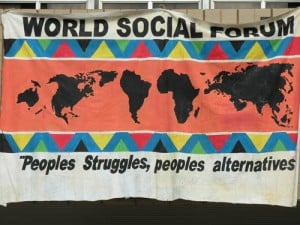
Seven years ago this month I served as an official translator at the 2003 World Social Forum (WSF) held in Porto Alegre, Brazil. The WSF movement served to counter the elite World Economic Forum (WEF) held annually in Davos, Switzerland by bringing together a wide range of anti-systemic radicals, mostly socialists of one tendency or another, from around the world, but especially Brazil and its South American neighbors. In this way it was a showcase for the Latin American left , anti-imperialists, environmental justice advocates, feminists, indigenous rights activists, vegans, nationalists such as Hugo Chavez’ Fifth Republic movement of Venezuela, and Brazil’s own democratic socialist community headed up by the Workers Party of current President Lula. More than anything, the WSF was Brazilian.
The 2003 WSF put the movement on map, in large measure because President-Elect Lula chose to emphasize his larger than Brazil leadership making an historic speech at this unique global gathering of social movement activists before boarding a jet to Davos where he called on world leaders from the corporate world and government to combat poverty and make the institutions of global authority more accountable and democratic. Lula was the perfect interlocutor between the rice and bean rebels of the WSF and the champagne soaked elite of Davos.
I could not directly witness Lula’s speech in Porto Alegre, but I listened to his talk on the TV sitting in corner of the translation room and was moved, not just by Lula, since I had attended several of his speeches in person during the 1980s and 1990s, but by the moment; an historic opportunity to finally bridge the two worlds of Davos and folks like me who had fought for civil rights in the U.S., human rights throughout the Americas and beyond, and sacrificed for a world less greedy and better prepared to include those marginalized by capitalism and corruption. Just days later, there was Lula again on the TV, talking to the elite of the world, negotiating for another world where transnational corporations would be responsible to their stockholders and to the communities they relied upon to carry out the business of global capitalism. I was a little tired from all the translations, from the press conference of Israeli and Palestinian peace activists to Danny Glover’s odd question and answer session (he was visibly upset at all the questions directed about him, his life… ah… celebrity status), but excited by the prospects of President –Elect Lula juxtaposed between the WSF and WEF, a human bridge between right and left, rich and poor, armed and defenseless, this world and the possibility of another.
Lula, the man and the president, returned to Porto Alegre today to address the WSF (this year there is a greater Porto Alegre meeting and a series of other meetings around the world throughout the year). In 2003 the WSF was animated by the possibilities of President-Elect Lula and the evil empire of then U.S. President George W. Bush and his plans to invade Iraq and send Saddam packing. Both Bush and Saddam are gone from the scene, but Lula’s speech today promised to remind the WSF movement and those that identify with it that a lot can be accomplished in relatively short time. He encouraged the participants,
“to continue to struggle for the impossible utopia with the will, courage, respect for diversity, and the solidarity that gave birth to Forum Social Mundial.”
Moreover, he concluded that
“South America and all of Latin America is living an extraordinary moment because of a series of progressive governments that have taken important steps toward the consolidation of democracy.”
Most interestingly, President Lula promised to travel to Davos to confront the developed world over the issues of the global financial crisis and the responsiblity to rebuild Haiti.
While his presidency has been controversial among many WSF attendees over the years, his personal and political accomplishments now frame the best strategy for making democracy meaningful for greater numbers of citizens, be they Brazilians, Iranians, or even North Americans. This strategy also lies at the very core of the WSF ethos, participation by all (even Danny Glover!). Brazil’s World Social Forum may not survive Lula’s pending departure from politics (don’t hold your breath for a return in 2014), but it has already served its purpose, bringing a little champagne to those who still eat rice and beans along the way.
Unfortunately, I am not attending the WSF festivities in Porto Alegre this year, but I’ll be listening to Lula, sipping some $10 bottle of brut in front of a plate of black beans, and knowing that another world is possible.